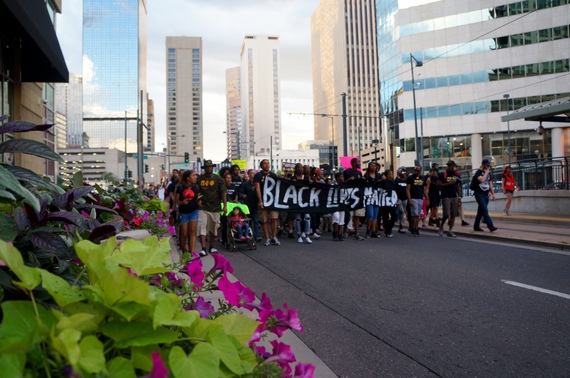
I haven't been able to bring myself to watch the video showing the incident that led to Natasha McKenna's death yet, but the description is more than enough to get a sense of the scene.
As you'd expect, it's beyond reprehensible. And as is often the case, this extreme example is emblematic of a broader problematic trend, in which people struggling with mental health issues land in jails or prisons because they aren't receiving the care they need. And of course, they're not able to receive that care once incarcerated.
We need to do better for people we incarcerate -- especially those with mental health disabilities who we shouldn't be incarcerating in the first place. And you'd hope that with the spotlight on police brutality brought on thanks to the ongoing Black liberation movement dubbed Black Lives Matter, rather than look away, we'd let tragedies like the killing of Natasha McKenna lead to revolutionary changes to our (in)Justice System.
It's a dark irony that we have such an authoritarian attitude in this democracy of ours. Because of this, we justify people in our jails and prisons being treated in terrible ways.
Sadly, this not only misses what should be the purpose of incarcerating people, it unnecessarily harms them.
First, our prisons are filled with nonviolent offenders whose crimes absolutely don't necessitate their removal from society. Secondly, many are dealing with economic, mental health, and/or addiction issues, none of which should be viewed through the prism of criminal justice in the first place. And finally, even those who are incarcerated for valid reasons and represent a legitimate danger to society don't deserve to be treated inhumanely.
Locking people away under barbaric circumstances doesn't achieve any semblance of justice. And it certainly doesn't ready people to leave incarceration. And make no mistake, even most violent offenders will be getting out. Preparing for this eventuality should be a primary goal within our prison system.
We need to get beyond the idea of a punishment-based society.
It's easy to see the barbarism of punishments in eras past; like the spectacle of execution or torture in a public square. But, like modern oppression often is, the spectacle of punishment today is no spectacle. It's more hidden from view, less overt, and unlikely to impact those with enough privilege and means to change it.
For the privileged, our idea of of what happens in jails and prisons often stems from "Orange is the New Black," or one of the many versions of MSNBC's "Lockup." These depictions, at-best, allude to reality, and do little to reveal the truth of the horrors that take place behind bars and barbed wire across the country.
We can do better.
But, for many of us, our privilege keeps us from even seeing that we need to do better. And so, in dark corridors of jails and prisons across the country, people like Natasha McKenna suffer while we go about our comfortable lives. And some, like her, have died, are dying, and will die as a result.
It's time for a new era of empathy, one in which we realize that those suffering deserve better. That as a society we can do better. And that until we wake the fuck up and force that to happen, we remain culpable in the oppression that our inaction perpetuates.


